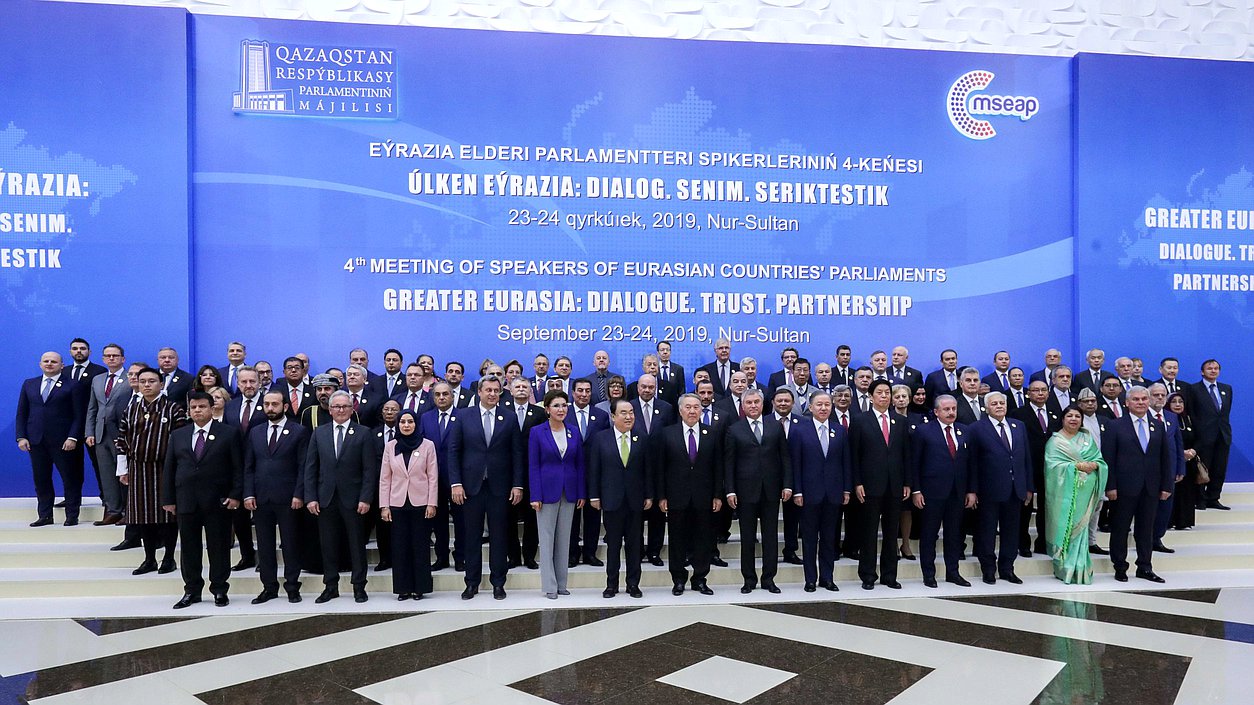
We, the participants of the 4th Meeting of Speakers of Eurasian Countries’ Parliaments
under the theme ”Greater Eurasia: Dialogue. Trust. Partnership“:
1. We share a common vision of the future of Eurasia as a single space of peace, cooperation and interaction, common values and equal opportunities and we express our readiness to promote a concerned and frank dialogue on the present and future of the Eurasian continent.
2. We note the special role of the legislative bodies of the European and Asian
countries in supporting the activities of regional integration associations for a comprehensive partnership based on the principles of respect for equality,
consideration of mutual interests, and in this regard, we emphasize the importance of establishing interparliamentary cooperation.
3. We note the historical contribution of the first President of the Republic
of Kazakhstan, Nursultan Nazarbayev, as the author and initiator of the Eurasian idea, as well as a number of successful integration economic
institutions within the Eurasian space; we support the concept of ”Greater
Eurasia“ and welcome the initiative of the ”Three Dialogues“
that were put forward by the first President of the Republic of Kazakhstan,
Nursultan Nazarbayev, and that are meeting the common interests of all Eurasian
states in strengthening peace, stability, and security.
4. We consider the search for joint response to current challenges and threats,
as well as the harmonization of geo-economic interests and ensuring greater
interconnection between the countries of Eurasia to be the main elements in the formation of a “single space of growth” in Eurasia, the creation of a free,
honest, non-discriminatory, transparent, predictable and stable trade and investment environment.
5. We believe that the formation of a system of constructive and non-confrontational interaction between the countries of Eurasia, based on the principles of mutual respect for sovereignty, independence, vital interests,
non-interference, non-use of threats, pressure and military rhetoric,
compliance with international law, the goals and principles of the UN Charter,
can give a powerful impetus to the development of the pan-Eurasian space,
accelerate economic growth in Eurasia.
6. We confirm the relevance of legislative support for achieving the UN
Sustainable Development Goals and joining efforts in the sphere of water, air,
energy, food, and environmental security, including security in the marine
environment and ecosystem, as well as in solving the most acute social problems
in regional and global dimensions.
7. We declare our continuing commitment to maintain the dynamism and inclusiveness of development processes in Eurasia, to build a prosperous
people-centered space, resistant to challenges; as well as our commitment to working together in implementing projects and programs of cooperation,
expanding interregional ties, improving the legal framework and contacts in various areas of interaction across the entire spectrum of bilateral and multilateral relations.
8. We consider it necessary to coordinate the efforts of parliamentarians in matters of digitalization, ensuring digital sovereignty, protecting the rights
of citizens in the digital space, as well as the innovative development of economies for the environmentally safe, sustainable and balanced development of Eurasian states.
9. We emphasize the relevance of cooperation in issues of disarmament, arms
control and non-proliferation of nuclear weapons, as well as the peaceful use
of nuclear energy. We urge parliaments to participate actively in building a world free of nuclear weapons.
10. We share the common opinion that achieving full denuclearization of the Korean Peninsula and establishing a permanent peace regime will contribute to the peace and prosperity of Eurasia and other regions and express our support
for resolving the North Korean nuclear issue through dialogue.
11. We
condemn terrorism in all its forms and manifestations as one of the main
threats to humanity and sustainable development and express our strong
intention to strengthen and develop inter-parliamentary cooperation in the fight against terrorism in accordance with the UN Charter and the principles of international law, without political egoism and double standards, respecting
the sovereignty and independence of the states of the continent and the whole
world, to seek a coordinated position of our countries on this issue.
12.
Recognizing the seriousness of the refugee situation in Eurasia, with major
political, social, economic and especially humanitarian consequences, we call
for more effective concerted efforts of the international community to jointly
address this problem.
13. We
stand for consolidated efforts against the use of information and communication
technologies and any new technologies to destabilize security on the continent,
to promote the ideas of terrorism, separatism, extremism, racial and religious
intolerance on the Internet. We call for continued cooperation in the field of ensuring information and cyber security.
14. We
emphasize the need to develop cultural and humanitarian ties to strengthen
cooperation, trust and mutual understanding between the nations living in Eurasia.
15. We advocate
the further development of inter-civilizational, intercultural and inter-religious dialogue, including through the dissemination and use of the practices and experience of the Congress of Leaders of World and Traditional
Religions and similar initiatives and forums.
16. We
positively evaluate the results of the 140th Assembly of the Inter-Parliamentary Union and related events that were successfully held by the State of Qatar on April 6–10, 2019.
17. We
express our deep gratitude to the Mazhilis of the Parliament of the Republic of Kazakhstan for the hospitality and successful holding of the 4th Meeting of the Speakers of the Eurasian Countries’ Parliaments in the capital of Kazakhstan,
Nur-Sultan.
18. We
reached an agreement to hold the 5th Meeting of the Speakers of the Eurasian Countries’
Parliaments in the Republic of Indonesia in 2020.
